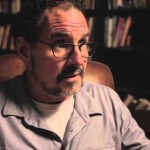We run our website the way we wished the whole internet worked: we provide high quality original content with no ads. We are funded solely by your direct support. Please consider supporting this project.

A Non-Violent Creation
A biblical teaching that we often overlook regarding the centrality of non-violence concerns God’s original vision of creation. We have grown so accustomed to the violence we experience as a part of nature that we don’t even question whether it is supposed to be the way it is. However when we see God’s vision for nature and vision of what the world will be like once it’s freed from the principalities and the powers, then it becomes obvious how foundational the call to non-violence is. In Genesis 1:29-30 we find the Lord telling the original humans:
I give you every seed–bearing plant on the face of the whole earth and every tree that has fruit with seed in it. They will be yours for food. And to all the beasts of the earth and all the birds in the sky and all the creatures that move on the ground—everything that has the breath of life in it—I give every green plant for food (emphasis added).
According to this passage, God gave “every green plant “ to every living thing for food. He did not give animals to each other, or to humans, for food. The original “food chain”, it seems, was completely free of violence.
This point is reiterated in Genesis 2 when the Lord tells Adam he was “free to eat from any tree in the garden” (vs. 16-17, emphasis added) but does not say that Adam was free to eat any of the animals. Even after the fall God specifies that humans were to eat “the plants of the field,” despite the fact that they’d be more difficult to grow because of the curse that had come upon the land (Gen. 3:18-19). However literally or symbolically one interprets this aspect of the Genesis narrative, it clearly teaches that it was not God’s original ideal to produce a nature “red in tooth and claw” (Tennyson).
God’s non-violent ideal for creation is also expressed when God announces what creation will look like in the future when his Kingdom is fully established. Through Isaiah the Lord declares:
The wolf will live with the lamb,
the leopard will lie down with the goat,
the calf and the lion and the yearling together;
and a little child will lead them.
The cow will feed with the bear,
their young will lie down together,
and the lion will eat straw like the ox.
Infants will play near the hole of the cobra;
young children will put their hands into the viper’s nest.
They will neither harm nor destroy
on all my holy mountain,
for the earth will be filled with the knowledge of the LORD
as the waters cover the sea. (Isa 11:6-9. cf. Isa. 65:25; Hos. 2:18) .
Obviously, a world in which wolves and lambs get along and in which lions eat straw and children play with cobras is a world that operates by very different laws than our present one. Indeed, because the only nature we’ve ever experienced is the intrinsically violent one we find ourselves in, we have trouble imagining what a non-carnivorous wolf or lion or a non-poisonous copra would be like. But this shouldn’t surprise us since we have the same difficulty imagining what our resurrected bodies will be like.
It seems that when the reign of God is fully established on earth, the hostility that exists among animals and between animals and humans, will be brought to a complete end. Nature will no longer look like it’s crafted by a “roaring lion seeking whom he may devour” (I Pet. 5:8), but by a benevolent Creator who possesses the kind of character we find in Jesus. God’s ideal for creation, expressed in Genesis 1 and 2, will finally be attained. There will be a “new heaven and a new earth,” in which all suffering, violence and death will be eradicated (2 Pet 3:13; Rev. 21:1). The world will then be free of all elements of the curse, including thorn bushes and briers (Isa 55:13). God’s love and God’s peace will characterize everything. This demonstrates that the violence, death-filled nature we presently live in reflects the corruption of the principalities and powers of evil, not the ideal will of God.
Category: General
Tags: Creation, Non-Violence, Peace, Warfare Worldview
Topics: Enemy-Loving Non-Violence
Related Reading

Does the Old Testament Justify “Just War”?
Since the time of Augustine, Christians have consistently appealed to the violent strand of the Old Testament to justify waging wars when they believed their cause was “just.” (This is Augustine’s famous “just war” theory.) Two things may be said about this. First, the appeal to the OT to justify Christians fighting in “just” wars…

Resisting Evil
The New Testament refers to Satan as the “god of this age” and the “ruler of the power of the air” (2 Cor 4:4; Eph.2:2). In the first century Jewish worldview, “air” referred to the domain of spiritual authority over the earth. The author, Paul, was thus saying that the spiritual environment of the earth…

What is the Warfare Worldview?
The warfare worldview is based on the conviction that our world is engaged in a cosmic war between a myriad of agents, both human and angelic, that have aligned themselves with either God or Satan. We believe this worldview best reflects the response to evil depicted throughout the Bible. For example, Jesus unequivocally opposed evils…

The Warfare Worldview: What Would You Tell the Younger You?
Aftab Uzzaman via Compfight Jessica Kelley has been fleshing out the Warfare Worldview on her blog in a series of posts using the lens of the death of her child, Henry. Jessica is a beautiful writer, and her reflections are powerful and tender. You’re going to want to be listening to her. Her voice is an…

Video Q&A: What if violence is necessary to protect a loved one?
We recently posted a video Q&A on open theism and we received a lot of positive feedback. We’re happy to share another of these today on the question of non-violence. Greg has answered this question previously, but he expands on his answer here in a way he never has before. Be blessed!

Why Vegetarianism Instead of Veganism?
Greg talks about vegetarianism and veganism. http://traffic.libsyn.com/askgregboyd/Episode_0054.mp3
